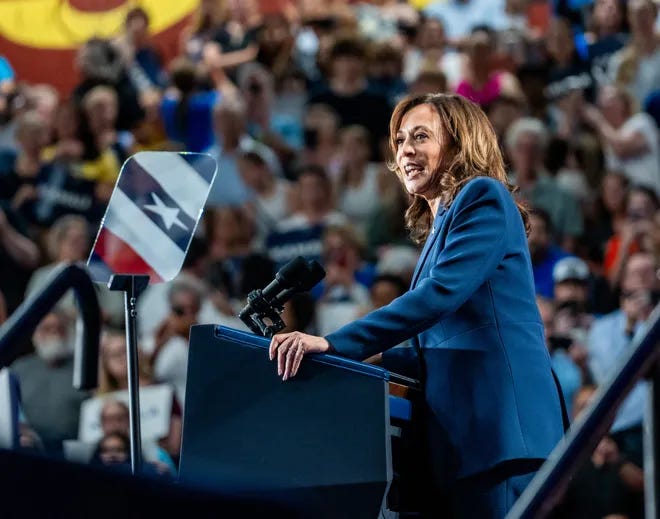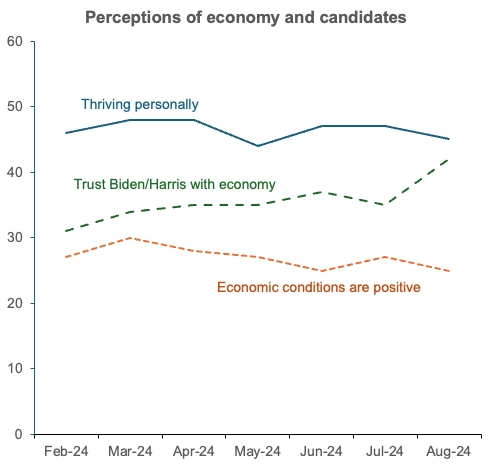Have the vibes shifted?
Economic impressions aren't improving, but Harris has some space to maneuver
One of the real curiosities in the American political environment over the past few years has been ongoing negative sentiments about the economy despite considerable economic improvements. Americans have tended to consider the national economy to be in poor shape even as the economy has grown, inflation has shrunk, and unemployment has stayed at or near record lows, and this is historically unusual.
One possible explanation is that this was Biden-related “vibes.” That is, people were down on Joe Biden for a number of reasons, including but not limited to his advanced age, and that was causing them to think worse of the economy, as well. Now that we’re a few weeks into this new era where Biden is not standing for reelection, we have a little bid of evidence to bring to bear on this.
The Financial Times has polled voters on several questions about the economy, asking people if they are thriving personally and if they think national economic conditions are overall positive. They also asked people who they trust more to handle the economy: Donald Trump or Joe Biden (or, starting in August, Kamala Harris). The results appear in the graph below:
What we see here is that assessments of the economy have not improved in the last month. Indeed, the overall trend is down slightly. But people trust Harris to manage the economy considerably more than they trusted Biden. (She is currently about tied with Trump by this measure, whereas Biden trailed Trump by around six points.)
It’s still early, of course, but the suggestion here is that dour views of the economy are not just pegged to Biden. (Maybe they are, of course, and will change once he leaves the White House. But he’s receded well into the background lately and it hasn’t changed the economic impressions.)
Meanwhile, at least until very recently, it’s not like Harris has mapped out some economic agenda that’s sharply distinct from Biden’s. In fact, she’s been a strong booster of the administration’s policies. But a few things are helping her here:
First is the generally strong rollout of her presidential campaign. She’s created a very positive reaction to her candidacy, increasing her general favorability by 5-6 points, and that is surely elevating her approval ratings in various issue areas.
The second is a certain amount of ambiguity that surrounds her policy stances. That is, people know that she’s associated with Biden’s policies but haven’t been sure exactly what her stances would be separate from his, and for the most part, ambiguity is good for a candidate. It allows people to project what they want onto a candidate before they actually have to commit to a policy and creates some deference toward them.
At least for now though, we still aren’t seeing voter impressions of the economy match economic realities. It could just be that relatively high housing costs and interest rates are crowding out all other economic impressions. It could be that there are other dislocations in the post-pandemic political economy that just aren’t well captured by standard economic indicators. Voters are still grumpy. Kamala Harris has more insulation from it than Joe Biden did, but it’s still an issue for her and her party.







I'm a staunch Democrat who appreciates your analysis very much.
I do think there's no secret or mystery around "ongoing negative sentiments about the economy despite considerable economic improvements." Biden's "failure" on the economy, whether or not it's true, has been hammered home as a GOP talking point by loyalist outlets like Fox News and the Wall Street Journal. Even though there are economic indicators that suggest a bad economy, the truth is far more positive--and the only reason people feel that way is because it has been so widely shared in bad-faith reporting that it's been embraced as truth.
What stuck out to me the most on your graph is that people's perception of the economy has fluctuated fairly similarly to whether they feel they are thriving. This is what I feel is so often missed when this question comes up. It doesn't matter one iota what the stats say about the economy to people whose daily reality doesn't reflect those stats. I know I am not thriving, and there are many reasons for that I won't go into here, but I do feel slightly bitter whenever I read the confused, incredulous, pondering of those who don't understand why so many of us don't recognize all the great things Biden has apparently done for the economy. If a person struggles to pay the bills; if they go without needed health care because they can't afford it; if every single little purchase is a fraught deliberation about what necessities should be prioritized and which will be done without, why on earth would they be swayed in their understanding of that experience by pundits who say it's all getting much better? The criteria used to assess the state of the economy do not accurately reflect the lived reality of a hell of a lot of people. That said, I do believe my chances are better with Harris than with Trump, and "the economy" isn't my highest priority anyway (I think I'd rather poke myself in the eye with a rusty fork than even consider voting for a Republican). But it still chaps my hide to see how confused the "experts" continue to be about this issue.